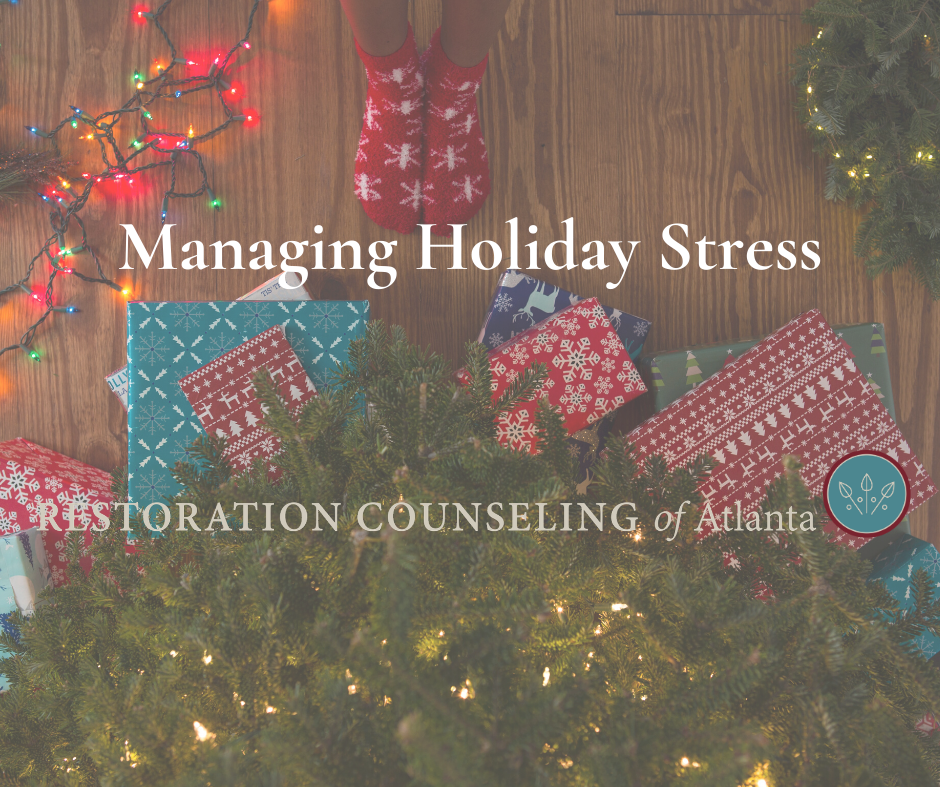Stressed? You are not alone!
Are you feeling less than jolly this holiday season? If so, you are not alone. According to a survey conducted by Verywell Mind, more than 80% of Americans find the holiday season, “somewhat to very stressful.” Many things contribute to holiday stress. These may include pressures related to gift-giving, financial burdens, social obligations, family dynamics, and eating or drinking excessively and complicated emotions related to grief and loss. Generally having too much to do may cause angst during this time of the year
Is it Holiday-related Stress?
Are you experiencing an increase in anxiety, sleeplessness, sadness, irritability, or have an upset stomach, or body and headaches this season? If so, you may be experiencing holiday-related stress. Fortunately, the holidays last for only a few weeks each year. It is likely that in time, many of these symptoms will resolve. Still, it is important to pay attention to how you feel. Recognizing holiday-related stress will allow you to pause, identify why you are stressed, and take steps that will help you to enjoy the season.
Useful Tips for Managing Stress
1. Maintaining Perspective
It is easy to lose perspective amidst the hustle and bustle of the holidays. We experience excessive busyness, cultural messages embedded with commercialism, and the expectations we place on ourselves and others to make the season, “just right.” This may distance us from the meaningfulness of this time of year. Intentionally taking time to remember and marvel at the reasons we celebrate helps to place our focus on our values and maintain a more peaceful perspective. It may be helpful to:
- Read an Advent devotional that focuses on the birth of Christ.
- Write down at least three things that you are grateful for at the end of each day.
- Sit quietly to contemplate the birth of Christ and the blessings of the past year.
- Ponder the hopes of the coming new year.
- Serve others who are less fortunate.
2. Managing Gift Giving and Financial Burdens
Gift giving is a source of holiday-related tension for many people. We shop in crowded stores, trying to find the “perfect gift,” and provide gifts for the family members and friends we love (and even for a few who are tough to love). This may result in symptoms of stress and financial burden. Planning ahead, managing expectations, and budgeting go a long way in easing stress related to gift-giving. It may be helpful to:
- Make a list (and check it twice) of people you want to remember with a gift this season.
- Set a gift budget before the holidays and track spending.
- Begin shopping early.
- Shop online if you don’t enjoy crowds.
- Manage and clearly communicate gift-giving expectations.
- Check out these articles from the American Psychological Association, “Dealing with the Pressure of Gift Giving,” and “Dealing with Financial Stress.”.
3. Reducing Social Stress
Social stress can dampen joy in the midst of celebrating. For some, attending multiple parties, spending extended time with relatives and numerous holiday events can lead to social and emotional pressure. Others experience social stress because they want to celebrate with others but are alone and feeling lonely. In order to relieve social stress:
- Accept only invitations to celebrations that you genuinely want to attend.
- Remember the big picture –consider what kinds of holiday memories you want to create with extended family.
- Take a few minutes for yourself away from the crowd.
- Thank people for the positive ways they have impacted your life.
- If you are alone and feeling lonely, be intentional in reaching out to celebrate with others and engaging in meaningful activities.
4. Maintaining Healthy-Habits
This time of year, it is easy to overindulge in food and drink. Social gatherings, holiday parties, and those “once a year” favorite treats make it tempting to eat extra or drink more than we normally would. Busyness has the capacity to deter us from our healthy routines. Don’t let the temptations of the season adversely impact your health:
- Be careful to monitor sweets and rich food.
- Be intentional about staying hydrated.
- Prioritize exercise and movement.
- Set boundaries around time for contemplation, prayer, and mindfulness.
- If you want to reduce drinking or are in recovery, check out “Tips for Protecting Your Sobriety during the Holidays and Preventing Relapse” from the Hazelden Betty Ford Foundation.
5. Grief and Loss
The holidays can be particularly stressful for those who have lost loved ones. Empty places at the dinner table, lost traditions, and watching others celebrate with their loved ones can make the pain of grief seem overwhelming. To help manage grief during the holiday season:
- Allow yourself to feel your emotions.
- Be intentional about taking time to remember the life of loved ones.
- Communicate your needs and emotions to family and friends.
- Be careful not to isolate yourself.
- Get involved in opportunities to help others who are grieving.
- Start new traditions.
- Attend a holiday grief group such as GriefShare’s “Surviving the Holidays”
Practical Tips from the Restoration Counseling of Atlanta Team
I asked the Restoration Counseling of Atlanta team how they manage their holiday stress. Here are their suggestions, tested by personal experience.
- “Set the day before Thanksgiving as a deadline for Christmas shopping. Begin shopping no later than June 25th. Then get ready for the most boring December imaginable.” –Pat Caffrey
- “Say “no,” to events if I am feeling overwhelmed! (Christmas parties, gift exchanges, whatever). I used to feel bad about not saying yes, but now I actually enjoy the few events that I do attend.” –Hannah Fain
- “Rid myself of expectations that everything is going to go according to my plans. Family members share one thing they want that will make Christmas special and I try to make that one thing happen for each.” –Cameron Harrington
- “Try to avoid committing and give myself the freedom to make room for what I enjoy versus only considering what others want or need from me.” – Becca Cline
- “I don’t give up my usual “stress managers,” like the gym. Then, I take time to rest and watch shows, movies, soccer, with my family or snuggle with my pup. Plus chocolate –lots of dark chocolate.” –Paige Santmyer
- “Remind myself of what the season is about and prayerfully ask then trust all will happen as it needs to, not as I need it to.” –Debbie Turner
- “I love the Advent season. It is good to try to slow down and be intentional with my prayer time and ask God to show me who needs his love during this season. I want to focus on finding people who need to be encouraged and cared for.” –Mead Reed
- “Be intentional about slowing time and thinking about the meaning of the Christmas season. Many evenings, I drink a cup of hot tea while sitting next to the Christmas tree. When I need perspective, I go outside and stargaze.” –Andrea Brandt
Resources
https://www.apa.org/helpcenter/holiday-stress-gift-giving
https://www.apa.org/helpcenter/holiday-stress-finances
https://www.griefshare.org/holidays
https://www.hazeldenbettyford.org/articles/tips-for-enjoying-sober-holidays
https://www.healthline.com/health/holiday-stress#tips
https://www.verywellmind.com/understanding-and-managing-holiday-stress-3145230
 Written by Andrea Brandt, NCC, APC
Written by Andrea Brandt, NCC, APC
andrea@restorationcounselingatl.com, ext. 154
Roswell Location
Andrea graduated this past May with a Master’s Degree in Clinical Mental Health Counseling (CMHC) from Richmont Graduate University, a Christ-centered academic environment. She is now an Associate Professional Counselor (APC) serving clients at Restoration Counseling of Atlanta and is currently under supervision and direction.
Andrea’s education has equipped her to work with women, men, couples, and teens from various backgrounds who desire to change unwanted habits and behavior, reduce stress and depression related to daily living and past experiences, improve relationships, and enhance overall well-being. She also works with clients who are experiencing the pain of grief and loss.

